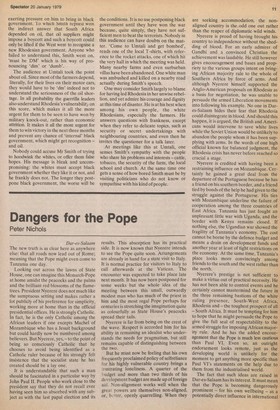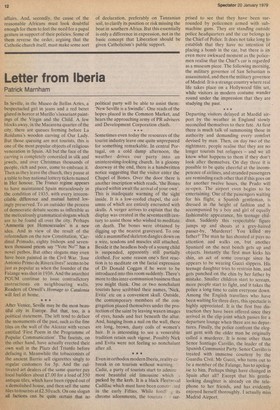Dangers for the Pope
Peter Nichols
Dar-es-Salaam The new truth is as clear here as anywhere else: that all roads now lead out of Rome; meaning that the Pope might even come to Tanzania one day.
Looking out across the lawns of State House, one can imagine this Monarch-Pope at home amidst the peacocks and the palms and the brilliant red blossoms of the flametrees. President Nyerere does not much like the sumptuous setting and makes rather a lot publicly of his preference for simplicity, working more at home than in the official presidential offices. He is strongly Catholic. In fact, he is the only Catholic among the African leaders if one excepts Machel of Mozambique who has a Jesuit background but could hardly now be numbered among believers. But Nyerere, yes, — to the point of being so consciously Catholic that he chooses to avoid being identified as a Catholic ruler because of his strongly felt insistence that the socialist state he has created should be a lay one.
It is understandable that such a man should be fascinated in a particular way by John Paul II. People who work close to the president say that they do not recall ever having seen him so absorbed with any subject as with the last papal election and its results. This absorption has its practical side. It is now known that Nyerere intends to see the Pope quite soon. Arrangements are already in hand for a state visit to Italy. It is normal practice for visitors to Italy to call afterwards at the Vatican. The encounter was expected to take place late next month. It has now been postponed for some weeks but the whole idea of the meeting between this small, outwardly modest man who has much of the priest in him and the most regal Pope perhaps for centuries is stretching the imagination quite as colourfully as State House's peacocks spread their tails. Nyerere is far from being on the crest of the wave. Respect is accorded him for his ability in remaining an idealist who understands the needs for pragmatism, but still remains capable of distinguishing between the two.
But he mint now be feeling that his own frequently proclaimed policy of selfreliance for his highly vulnerable country brings a frustrating loneliness. A quarter of the 'budget and more than two thirds of his development budget are made up of foreign aid. Non-alignment works well when the great powers are themselves non-aligned, or, lYtter, openly quarrelling. When they are seeking accommodation, the nonaligned country is the. odd one out rather than the reaper of diplomatic wild winds.
Nyerere is proud of having brought his country to independence without the shedding of blood. For an early admirer of Gandhi and a convinced Christian the achievement was laudable. He still however gives encouragement and bases and propriety to the various groups intent on bringing African majority rule to the whole of Southern Africa by force of arms. And although Nyerere himself supported the Anglo-American proposals on Rhodesia as a basis for negotiation, he was unable to persuade the armed Liberation movements into following his example. No one in Dares-Salaam hides their fear that Rhodesia could disintegrate in blood. And should this happen, it is argued, the British and Americans would intervene to save white lives while the Soviet Union would be unlikely to abandon the people whom it has been supplying with arms. In the words of one high official known for balanced judgment, the Rhodesia crisis has never before reached so crucial a stage.
Nyerere is credited with having been a restraining influence on Mozambique. Certainly he gained a great deal from the departure of the Portuguese because he has a friend on his southern border, and a friend tied by bonds of the help he had given to the struggle against the Portuguese. His ties with Mozambique underline the failure of cooperation among the three countries of East Africa. Tanzania has just fought an unpleasant little war with Uganda, and the border with Kenya remains closed. If nothing else, the Ugandian war showed the fragility of Tanzania's economy. The cost cannot be borne by the defence budget and means a drain on development funds and another year at least of tight restrictions on the economy. At the same time, Tanzania's place looks more convincingly among friends to the south and the west rather than the north.
Nyerere's prestige is not sufficient to make a virtue out of practical necessity. He has not been able to control events and he certainly cannot mastermind the future in the three remaining bastions of the white ruling presence, South-West Africa, Rhodesia and — the toughest prospect of all — South Africa. It must be tempting for him to hope that he might persuade the Pope to give the full seal of respectability to the armed struggle for imposing African majority rule. And he has the added encouragement that the Pope is much less cautious than Paul VI. Even so, an outright endorsement looks remote, just as the developing world is unlikely for the moment to get anything more specific than Paul VI's statements on the help due to them from the industrialised world.
The fact that such ideas are raised in Dar-es-Salaam has its interest. It must mean that the Pope is becoming dangerously prominent — for his own wellbeing — as a potentially direct influence in international affairs. And, secondly, the cause of the reasonable Africans must look doubtful enough for them to feel the need for a papal gesture in support of their policies. Some of them reverse the order, arguing that the Catholic church itself, must make some sort of declaration, preferably on Tanzanian soil, to clarify its position or risk missing the boat in southern Africa. But this essentially is only a difference in expression, not in the basic concept that Liberation should be given Catholicism's public support.



































 Previous page
Previous page